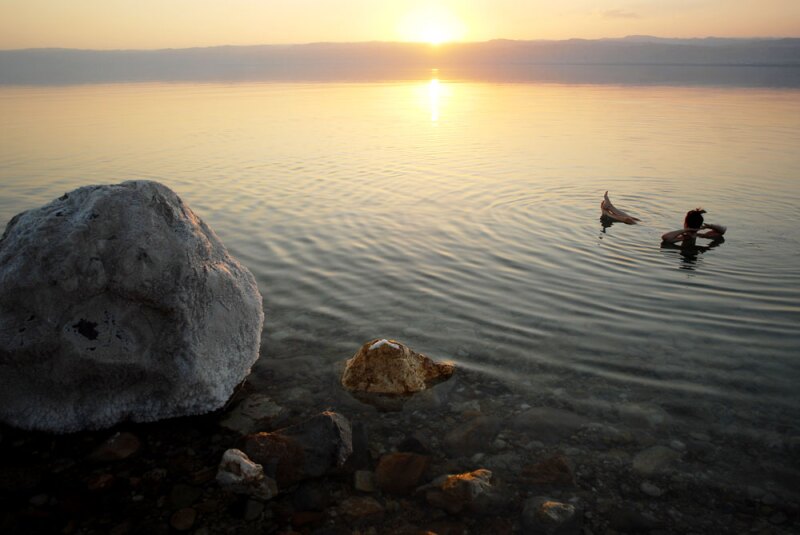Wedged between the banks of Jordan and Israel, the famously salty Dead Sea is, many say, running dry. Why? For decades, industry has plundered the water, 10 times saltier than the world’s oceans, for its wealth of minerals. Unless a contentious $1 billion replenishment plan is approved (and works), it will continue to vanish at a rate of 3.3 feet of depth per year. In the meantime, travelers have a small window to experience one of the greatest outdoor spas on earth, float in its fizzy hot waters, and slather on mud with these restorative ingredients. For now, at least, travelers can still visit this natural wonder.
What’s the dead sea made of?

The Dead Sea or ‘Yam Hamelach’, sea of salt in Hebrew, is considered the lowest point on Earth. It is 1300 ft below sea level. The extra-ordinary salt in the water enables bathers to float. Here are the other things the sea is made of.
Silicon dioxide: A mineral also found within 90 percent of all rocks, silicon diaxode is known to strengthen bones and pump up the body’s production of collagen.
Selenium: Believed to be anticarcinogenic when consumed orally, this powerful trace element is used by visitors (and sun-drenched local hotel workers) to soothe psoriasis.
Halite: Coat yourself well and your float doubles as a full-body massage. The chloride mineral halite de-stresses strained muscles.
Magnesium: One of Mother Nature’s triple threats, magnesium calms inflamed skin, kills bacteria, and is so good at moisturizing it may erase some years.
Learn more about the Dead Sea at the Museum at the Lowest Place on Earth

Museum at the Lowest Place on Earth
As its name implies, this museum on the Dead Sea’s southern peninsula sits a staggering 1,329 feet below sea level. There’s more to see than just the rather impressive altimeter in negative figures, however. Housed in a beautiful modern building that unfurls like a nautilus shell, the museum boasts well-presented archaeological remains and modern artifacts covering some 4,500 years of human habitation in the surrounding area. Standout pieces range from Bronze Age pottery to contemporary woven baskets made from discarded plastic bags.
After touring the museum, head uphill to Lot’s Cave, where the namesake prophet’s wife was turned into a pillar of salt after the couple fled Sodom and Gomorrah. A small Byzantine monastery marks the location.
Hotels near the Dead Sea

Mövenpick Resort/Zara Spa
After a dip, slather yourself with the purifying local mud or treat yourself to some pampering at a spa in one of the many hotel resorts along the coast.











